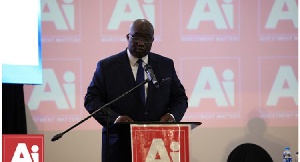 Joe Ghartey speaking at the function
Joe Ghartey speaking at the function
Minister of Railways Development, Joe Ghartey, has encouraged foreign investors to consider investing in Ghana’s infrastructural sector, especially the country’s rail subsector.
Hon. Ghartey disclosed this while delivering a keynote address on behalf of Vice President Dr. Mahamudu Bawumia at the AI CEO African Pension Wealth Fund Leaders’ Summit 2017 held in Durban, South Africa under the theme, ‘Facilitating Pension Fund Investment Partnership with African Asset Owners.’
The summit was aimed at focusing on investment strategies and governance and showcasing institutional-grade opportunities and instruments to de-risk and catalyse global and African institutional capital.
According to the minister, there were huge investment opportunities in the country’s rail sector currently.
“In Ghana currently, our priorities in infrastructure development include the rail sector and the energy sector,” the minister said.
Ambitious Programme
Hon. Ghartey told investors that “the rail sector has suffered neglect for a long time, and in the words of President Akufo-Addo this neglect of the rail sector is one of the tragedies of our post-colonial development as a nation.”
“We intend to address this tragedy as a nation. There are several opportunities in this sector and in the next three and a half years we have admittedly ambitious programme of constructing approximately 1,200 kilometres of rail.”
“This programme of developing associated infrastructure, including new industrial estates, inland rail terminal, new suburban housing and commercial centres all create opportunities for investors,” he said.
According to Hon. Ghartey, the expansion of the rail sector is economically viable and would also transform Ghana from a lower middle income to a first world country.
“Mining, agriculture and freight in Ghana, as well as to landlocked countries north of Ghana, assures the economic viability of the rail network, he said.
He added that the building of a modern railway network, coupled with our programme of developing associated rail infrastructure under the programme dubbed ‘From Stations to Cities’ which seeks to take advantage of the rail network to bring accelerated economic development to the rail corridors will transform Ghana’s economy.
The minister explained that private sector investment was crucial in bridging the infrastructural deficit on the African continent.
“It is important therefore that clear strategies are developed to attract African sovereign wealth funds and pension funds for investment across Africa,” he said.
Unfortunately, the pension sector in Africa is not as large as it ought to be. With the exception of South Africa, the African continent is on the fringes of the global pensions industry.
According to the Global Pension Assets Study, the 10 biggest African markets have a combined asset value of $37 billion.”
While Africa adopts measures to increase pension penetration, it must also take steps to create an enabling environment for other pension funds, including US and Global Pension Funds and institutional investors, he said.